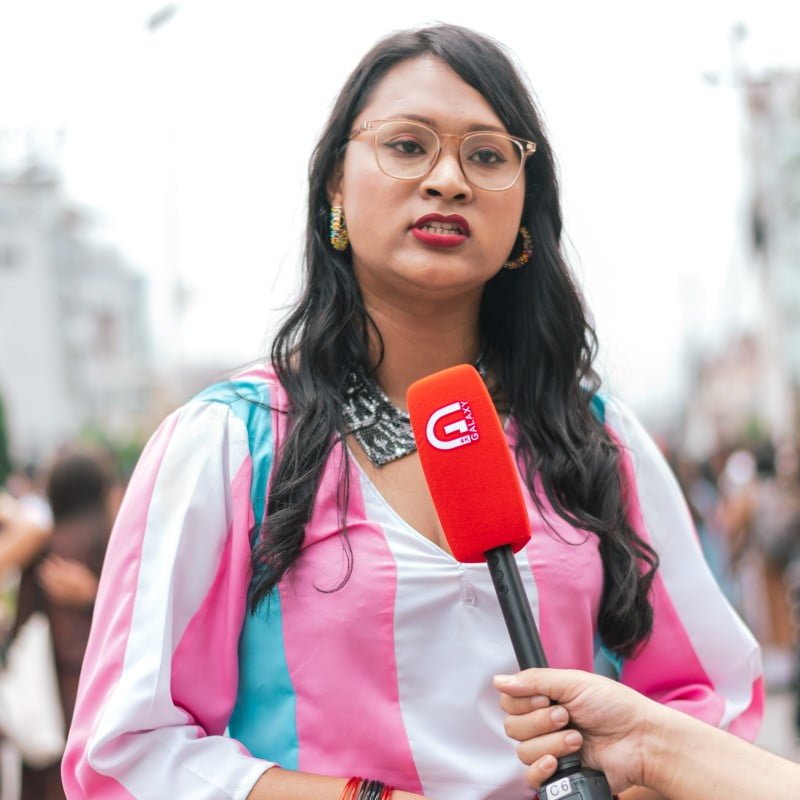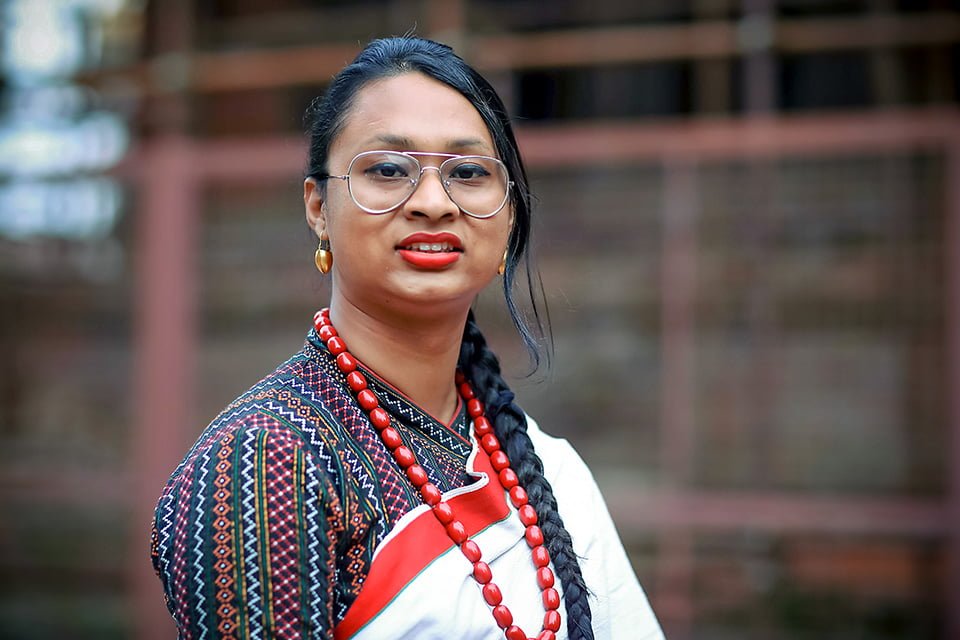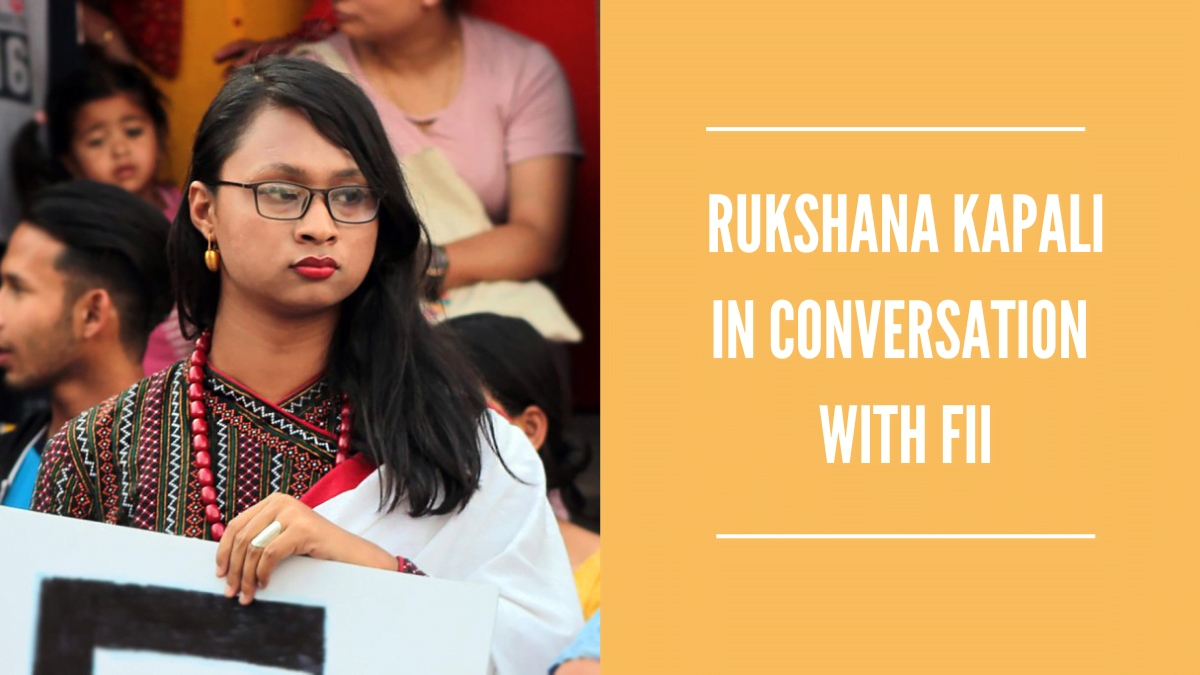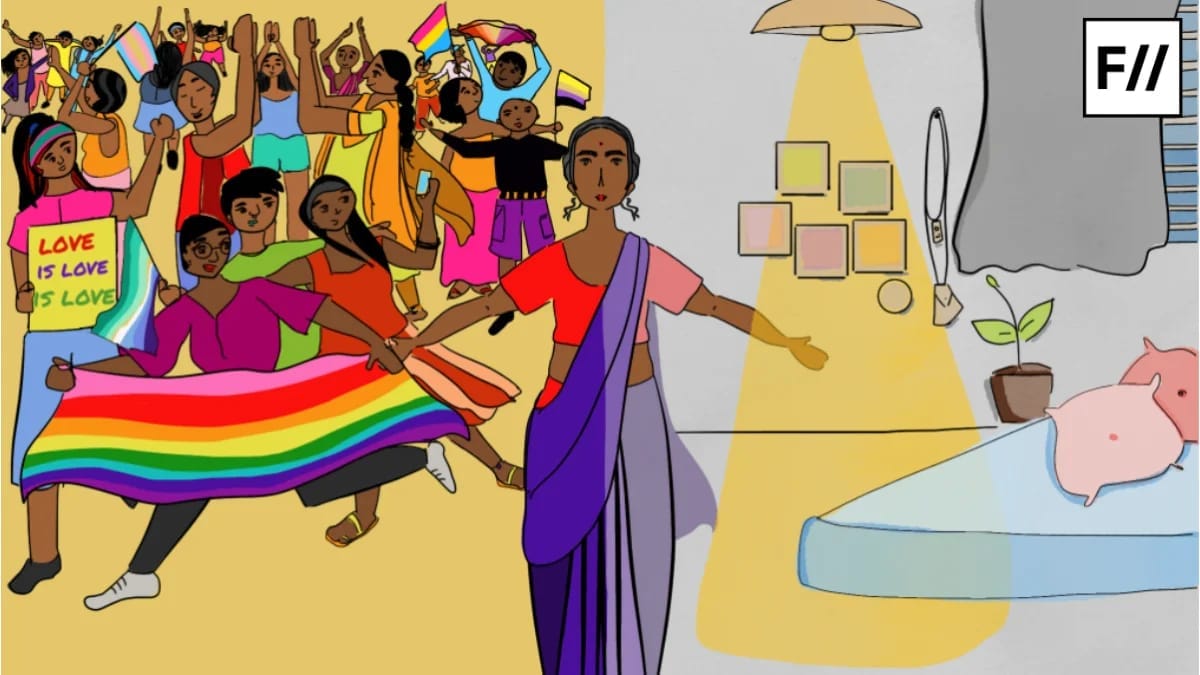Rukshana Kapali is an advocate for Transgender Rights and has been recognised by BBC as one of the 100 influential women of the year 2023. She is currently pursuing a law degree at Chakrabarti Habi Education Academy College of Law. Rukshana earned her bachelor’s degree in Linguistics and Sociology from Tri-Chandra Multiple Campus, Tribhuvan University. In September 2020, she also completed a trans advocacy fellowship with the Asia Pacific Transgender Network.
Kapali is an activist for transgender human rights and a member of the indigenous Newa ethnic community, who uses the pronouns she/her. She is also the founder of Queer Youth Group, a non-profit organisation run by youths that focuses on improving, informing, and educating about queer identity. The group provides a safe space, tools, and resources to aid the LGBTQI community.
In an interview with FII, Rukshana Kapali talks about her years of activism journey to being the most inspiring woman in BBC 100 Women 2023.
FII: Could you tell us a little bit about yourself and your work as an activist?
Rukshana Kapali: I am 24 years old and I am a trans woman. I go by the title she/her. My work since 2020 has been around the intersections of Language, SOGIESC and Law, including Nepal Bhasa and Newa issues. I mostly work in knowledge production, such as research, awareness toolkit publications, academic writing, and so on. I also work around policy changing through legal activism, mostly by filing writ petitions in the courts.
FII: Recently, you’ve been listed as the most inspiring woman in BBC 100 Women 2023. How does it feel? Did that change anything for you, in terms of responsibility?
Rukshana Kapali: I feel happy. But more than anything, it’s a good feeling for people like us to have belief, hope and faith. Well, I think, there is visibility to my work, and it has motivated me and has changed the way people connect but I see, this is just a single step taken, there’s a lot more to be done in the coming days.
FII: Could you share with us a little bit about your family and how you came about your acceptance of your gender identity?
Rukshana Kapali: When I grew up, I had no access to the internet and social media as we have it now. As young as 13, I remember, I knew what I was feeling from within and gender is something you cannot pretend, it is what it is. I was able to identify myself as a trans in school. People did ask a lot of things to me and so many of them said that “time ta yesto ho vanda thaha pauda ta, timi ta naramro bato ma lageu, k huncha hola, bhavisya andhakar huncha hola” which was so hurting. My dad didn’t even look at my face.

I started my literal “coming out” while I was in the 9th grade. On my grandfather’s birthday, I stole Rs. 1500 and wore a yellow t-shirt, blue pants and a shawl over my head. My identity was first out at that time.
Socially, it’s been the most difficult for me. I grew up watching films, observing queer people who were misrepresented in the media. They were either clapping, asking for money or abusing. Even my friends used to ask me, “Ta pani voli parsi saree lagera train ma magna janchas ho?” People used to stare at me uncomfortably and still they do. For me, dismantling that sort of representation was the start of my journey. So, the very idea that I was able to learn was, that you are never different to yourself, you are only different to society. This hits but the truth is I am what matters.
FII: How do you find the legal system? What sort of legal battle have you had?
Rukshana Kapali: I am not pessimistic but I am not happy either. I loved Language and wanted to be an expert in that. After high school, I went to Tri-Chandra Multiple Campus, a Tribhuvan University affiliated to study Linguistics for my bachelor’s. However, I lagged in the registration process because of the pronoun issues that I identified in my school and high school certificates. The National Examination Board refused to correct my pronoun saying it had no laws, and on the other hand, Tribhuvan University denied that without having them make corrections, they couldn’t allow me for the registration.
I filed a case against them in the Supreme Court. It took me three years, then I joined Law to study at Purbanchal University. However, even joining this University was no different for me as I was able to get an exam admit card only after appealing to the public via social media about my issue. In Nepal, the administration processes are delayed, and if no courts work in favour of people like me, we would be abandoned from our own identities.
FII: What do you think about the category of ‘other’ in terms of gender labels? How should it be written in terms of citizenship?
Rukshana Kapali: What I feel is, in the perspective of the Nepal government, people like us are identified as ‘otherness,’ a community of people whose responsibility feels too heavy. Therefore, the concept of ‘anya’ in Nepali as the ‘other‘ category originates. What they do not understand is that LGBTQI individuals are diverse and identify as unique.

The term “LGBTQI” is taken so seriously but the truth is it doesn’t imply gender. I have often interrogated the media improvisations on the term ‘Tesro lingi’ and re-write it as ‘Para laingik.’ The term ‘Tesro Lingi‘ in the Supreme Court has undergone changes and made it to ‘Para Laingik.’ The case of each person has to be filed even today so the issues regarding their identity should be taken seriously but with prompt action.
FII: What do you think about family and marriage?
Rukshana Kapali: The major issue I see is that the system of law around marriage is made with the idea of heterosexuals which itself is biased. People still work with the mindset that only boys and girls can get married. There is no provision for family and marriage for people like me. Had I been there to make the laws regarding that back then, I would’ve made the inclusive provisions that also constitute LGBTQI people and amended them.

Nepal’s decision to have recently registered LGBTQI people’s marriages makes it too ahead in South Asian countries, however, there is so much to be done in terms of legal system and implications.
FII: Do you think the recognition of pronouns plays an important role in one’s gender and sexuality?
Rukshana Kapali: As long as something is taken as taboo in society, language cannot evolve. There are slang words uttered around the LGBTQI community in Nepal. For instance, the English language is friendly to people like us because they vigorously fought for many years as compared to Nepali which doesn’t have a dignified connotation. We do not have conversations about language and its etymology which means, the stereotypical narrative exists.
I was interested in learning about the word associated with my trans identity, especially from the Newa ethnicity that I belong to hence, I researched and worked in coordination with language experts from the field explaining the issues and therefore, I was able to publish a dictionary on Nepal Bhasa. The main objective of this dictionary is to teach any kind of person to get used to inclusive phrases.
Ruskahana Kapali
As a student of Linguistics for some time, I was interested in learning about the word associated with my trans identity, especially from the Newa ethnicity that I belong to hence, I researched and worked in coordination with language experts from the field explaining the issues and therefore, I was able to publish a dictionary on Nepal Bhasa. The main objective of this dictionary is to teach any kind of person to get used to inclusive phrases.
FII: Reflecting on your journey, what do you think is something that helped you motivate and can motivate?
Ruskahana Kapali: I feel life is a battle. Every wound you pass through will either shatter you or push you to become stronger than ever. You have to choose one either to be the victim or fight till the end. I chose the latter. What I have been through hasn’t been easier, so I understand stories like mine. Empathy is the greatest sword you can choose to make an impact. Also, now is the digital age, for someone who is battling through the difficulty of not getting the platform, I think it isn’t the age without the accessibility of the internet like how back then, I used to go to the cyber and sit in the corner and learn about what I was feeling.

Each person by heart should go by, “I am the author of my own story” where one’s story is written by only you and not others because there is a difference in how a story is being written. There is a possibility I see if one is determined to put their stories out, no matter what. Your voice matters.
About the author(s)
Susmita Aryal is a final year student of English Literature and Journalism at St. Xavier's College, Maitighar, Kathmandu. Besides storytelling around identity, gender and society, she is interested in 'art' i.e. any kind of artworks that fall under the genre of art.






